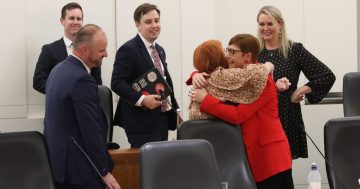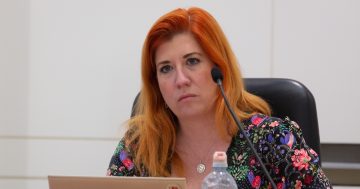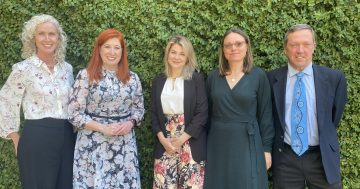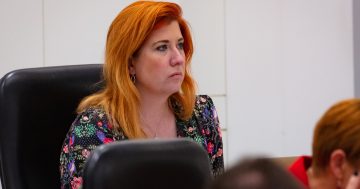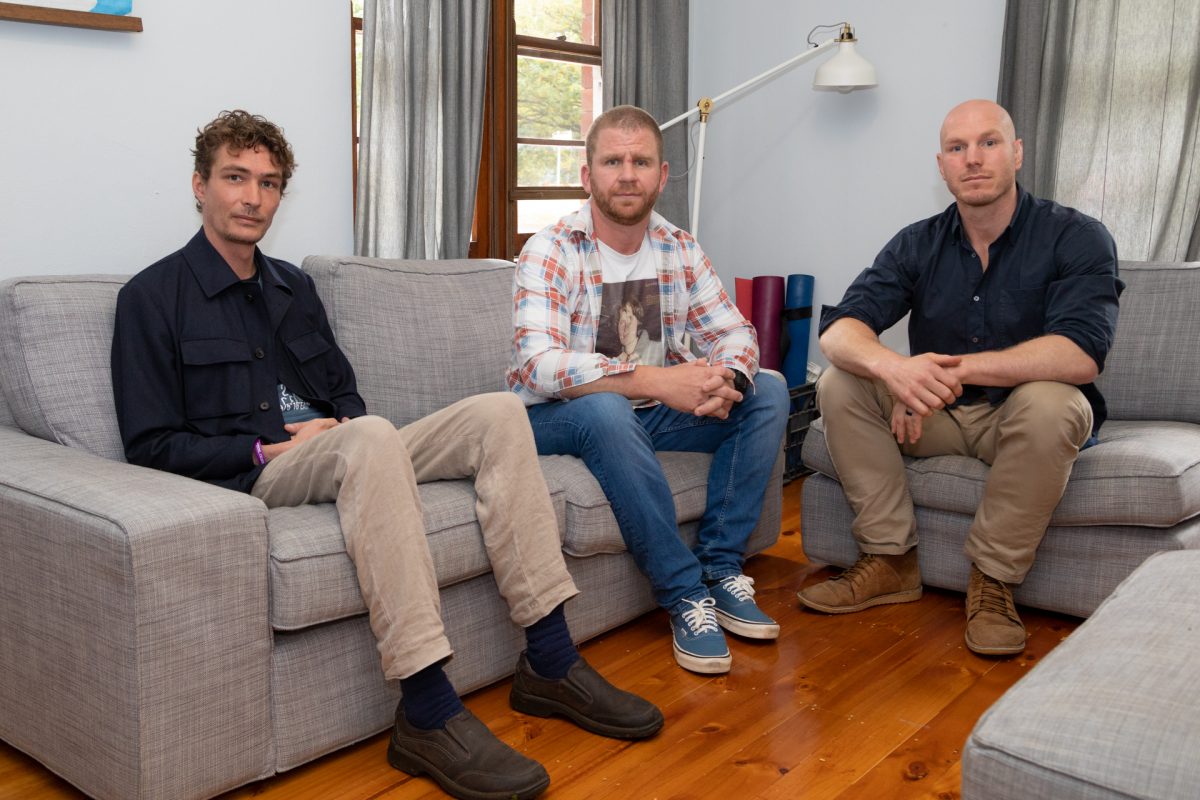
Voluntary assisted dying supporters Samuel Whitsed, left, and Sam Delaney with Independent Senate candidate David Pocock. Photo: Michelle Kroll.
Independent Senate candidate David Pocock has promised to move a private Senator’s bill to restore the ACT’s right to legislate on voluntary assisted dying in his first weeks in the Senate if he is elected on 21 May.
The pledge is a direct challenge to Liberal Senator Zed Seselja who has refused to support any moves to repeal the so-called Andrews bill that prevents the ACT from legislating on the issue, despite strong support in the Territory for it to have this right.
Mr Pocock said the community had raised the issue repeatedly with him during the campaign.
“Tragically, for some in our community, this is not a debate that can wait,” Mr Pocock said.
“The people I’ve spoken to who have loved ones, or who are themselves facing end-of-life choices, shouldn’t have to face moving interstate to access the full range of rights and dignities afforded to other Australians.”
The ACT has not been able to debate or legislate in the Legislative Assembly on this issue since 1997 when federal Liberal MP Kevin Andrews’ private member’s bill banned the territories from legislating on this matter.
Mr Pocock said that a quarter-century later, the ACT and Northern Territory were the only jurisdictions not to have voluntary assisted dying laws in place or be actively considering legislation in this area.
He said that as a matter of equity, people in the ACT should enjoy the same rights as other Australians to consider this issue.
Mr Pocock said he did not intend for the Federal Parliament to debate voluntary assisted dying but to amend the Australian Capital Territory (Self-Government) Act 1988 and the Northern Territory (Self-Government) Act 1978 to remove the prohibitions on the ACT and NT governments from legislating on the issue.
“My bill will only invite the Parliament to consider whether the territories should continue to be regarded as second class citizens or whether they should have the autonomy to consider this issue for themselves,” he said.
Mr Pocock said he supported the right of terminally ill people experiencing unrelievable suffering to have a conversation with their doctor about assisted dying.
“I deeply appreciate the range of very personal and deeply held beliefs on this topic,” he said.
“That’s why it’s so important that we, as a community, have the right to respectfully and compassionately consider this issue for ourselves.”
In a shot at Senator Seselja who opposes voluntary assisted dying, Mr Pocock said elected representatives should advocate in support of the community’s wishes, not make decisions for them based on personal preferences.
Mr Pocock said he had spoken to hundreds of Canberrans who wanted to address this inequity as a matter of urgency, including 39-year-old Samuel Whitsed, who has a rare stage four terminal cancer and Sam Delaney, who lost his mother Linda “Linny” Delaney in 2019.
“Samuel doesn’t want to suffer in his last months,” Mr Pocock said. “He doesn’t want to move away from his home in order to access voluntary assisted dying in another state. He simply wants to be able to have a conversation with his doctor should his pain become unbearable at the end of his life.”
Linny was diagnosed in 2012 at the age of 58 with early-onset dementia.
Sam said his mother, a nurse, knew from the moment she was diagnosed what was ahead of her and that there was no treatment, no cure, and she would experience immense suffering.
“She didn’t want it and would speak to Sam about how she wished she had the option to die with dignity on her terms,” Mr Pocock said.
“As Sam recalls it, it was those final days that were the hardest, in watching his mother succumb to this vicious disease in pain, and in a way that she would have thought undignified.”
Mr Pocock said that according to recent polling conducted by the Australia Institute, 76 per cent of Australians agree that people with terminal illnesses experiencing unrelievable suffering and who ask to die should be allowed to receive the assistance of doctors to do so.
The same polling said that 76 per cent of Australians believed that territory governments should have the right to consider voluntary assisted dying in their own jurisdictions.
Polling data from National Seniors Australia showed that an even greater proportion of older Australians in the ACT (87.4%) agreed with voluntary assisted dying, Mr Pocock said.












